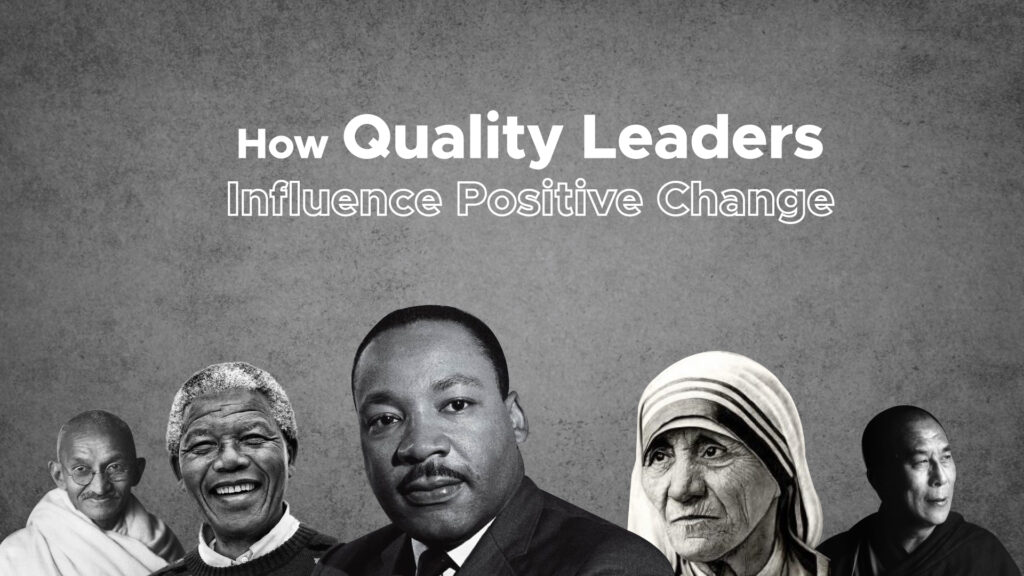How Quality Leaders Influence Positive Change
Leadership extends beyond mere authority; it encompasses the ability to motivate and steer individuals towards positive transformation. Throughout history, exceptional leaders have harnessed their influence, actions, and ideologies to revolutionize societies and instigate enduring positive change. In this article, we will delve into the roles of distinguished leaders who left an indelible mark on the 20th century: Nelson Mandela, Martin Luther King Jr., the 14th Dalai Lama, Mahatma Gandhi, and Mother Teresa. By examining their leadership approaches, we can extract valuable insights into how leaders can effectively propel constructive change.

1. Nelson Mandela (1918-2013):The Power of Forgiveness and Unity
Nelson Mandela, the former South African President, is acclaimed for his role in dismantling apartheid and promoting racial reconciliation. His leadership is characterized by resilience, forgiveness, and an unwavering commitment to unity. Mandela’s capacity to pardon his oppressors and advocate for reconciliation, rather than vengeance, set a potent precedent for his nation and the world. His leadership underscored the significance of transcending disparities for the collective benefit, fostering social cohesion, and constructing a more all-embracing society.
2. Martin Luther King Jr.(1929-1968): The Fight for Civil Rights through Nonviolence
Martin Luther King Jr. stood as a prominent figure in the American civil rights movement. His philosophy of nonviolent resistance and articulate speeches galvanized countless individuals to combat racial segregation and discrimination. King’s leadership illustrated the effectiveness of peaceful protests and civil disobedience in effecting systemic change. His dedication to justice, equality, and the supremacy of love over hate indelibly shaped the struggle for civil rights.
3. 14th Dalai Lama(1935-present): Spiritual Wisdom and Compassion
The 14th Dalai Lama, Tibet’s spiritual leader, has devoted his life to fostering peace, compassion, and interfaith dialogue. His leadership approach embodies humility, empathy, and a profound concern for the well-being of all sentient beings. The Dalai Lama’s teachings underscore the importance of inner metamorphosis as a conduit for a better world. His endeavors to bridge cultural and religious chasms emphasize the potential for constructive change when guided by spiritual sagacity and compassion.
4. Mahatma Gandhi(1869-1948): Satyagraha and Self-Reliance Proponent
Mahatma Gandhi, a pivotal figure in India’s struggle for independence, is renowned for his doctrine of nonviolent resistance, or “Satyagraha.” Gandhi’s leadership is founded on his faith in the potency of truth, self-reliance, and nonviolent protest. Through monumental movements like the Salt March, he demonstrated that even against formidable colonial powers, a determined and disciplined populace could attain independence through nonviolent means.
5. Mother Teresa(1910-1997): Selfless Service and Empathy
Mother Teresa’s leadership was grounded in her unyielding commitment to serving the most destitute. Her compassionate leadership accentuated the significance of selfless service and empathy. Her actions evidenced that the efforts of a lone individual, however unassuming, can wield a profound influence on society. Mother Teresa’s legacy continues to invigorate individuals and organizations to prioritize humanitarian endeavors and alleviate suffering.
The leadership paradigms of Nelson Mandela, Martin Luther King Jr., the 14th Dalai Lama, Mahatma Gandhi, and Mother Teresa elucidate that positive change can be attained through varied avenues. Be it forgiveness, nonviolent resistance, spiritual enlightenment, self-reliance, or selfless service, these leaders have showcased that transformative change stems from a lucid vision, steadfast dedication, and a genuine concern for the welfare of others. Their legacies persistently galvanize present and future generations of leaders to aspire to enhance the world through their deeds, expressions, and the values they uphold.
Find out Your Leadership Style With ClassTym & Register Now
Also Read- Explore the Leadership Styles: A Closer Look at the Many Facets of Leading.
